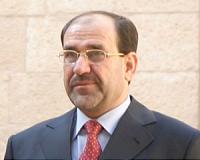| . |  |
. |
Baghdad (AFP) Dec 20, 2010 More than nine months after March 7 elections resulted in a prolonged political deadlock in Iraq, Prime Minister Nuri al-Maliki on Monday presented part of his new government to parliament. Here are the main developments in the political crisis over power sharing: MARCH - 7: Iraq holds its second parliamentary elections since Saddam Hussein was ousted by a US-led invasion in 2003. Turnout is 62.4 percent despite violence which killed 38 people. - 26: Preliminary results show the Iraqiya bloc of Iyad Allawi won the election with 91 seats, followed by Nuri al-Maliki's State of Law Alliance with 89, out of 325 total. Neither has enough to form a government on their own. - 27: Allawi says he is launching talks to form a coalition government. MAY - 4: State of Law joins forces with parliament's third bloc, the Iraqi National Alliance, with the newly-formed grouping, named the National Alliance, falling four seats short of an absolute majority. - 15: The movement loyal to radical Shiite cleric Moqtada al-Sadr, which holds 40 seats in parliament, lifts its veto over Maliki becoming prime minister again. JUNE - 1: Iraq's supreme court ratifies the results of the election. - 12: Maliki and Allawi hold talks for the first time following the election, and again meet on June 29. - 14: The new parliament holds its first session, lasting just 18 minutes. AUGUST - 16: Iraqiya breaks off all talks with State of Law in protest over Maliki describing the bloc as a Sunni grouping, which State of Law denies. SEPTEMBER - 25: Iraqiya announces it will not participate in a government led by Maliki. OCTOBER - 1: The National Alliance, the coalition made up of Maliki's bloc and the Iraqi National Alliance, chooses Maliki as its candidate for prime minister. - 24: Iraq's supreme court orders the country's parliament to elect a new speaker. NOVEMBER - 1: Maliki obtains the support of the Shiite Fadila party. - 8: Intense negotiations begin over a power-sharing agreement. - 10: Political leaders announce they have reached a deal over the ethnic and sectarian make-up of the three main positions of government, the president, prime minister, and speaker of parliament. - 11: Parliament holds just its second session since the election and chooses Osama al-Nujaifi, a Sunni and member of Iraqiya, as its speaker, and re-elects Jalal Talabani, a Kurd, as president. Talabani says he will name Maliki as prime minister. - 25: Talabani officially re-appoints Maliki as prime minister and orders him to form a cabinet, which he must do within 30 days. DECEMBER - 20: Maliki submits an incomplete list of cabinet ministers to parliament.
Share This Article With Planet Earth
Related Links Iraq: The first technology war of the 21st century
 Iraq PM to name cabinet without security ministers: sources
Iraq PM to name cabinet without security ministers: sourcesBaghdad (AFP) Dec 19, 2010 Prime Minister Nuri al-Maliki will take charge of Iraq's security temporarily as ministers heading the army and police will not be named when he unveils his cabinet on Monday, sources said on Sunday. Politicians said the sensitivity of the posts and the need for consensus on the three jobs - heading the ministries of interior, defence and national security - was the reason for the delay. ... read more |
|
| The content herein, unless otherwise known to be public domain, are Copyright 1995-2010 - SpaceDaily. AFP and UPI Wire Stories are copyright Agence France-Presse and United Press International. ESA Portal Reports are copyright European Space Agency. All NASA sourced material is public domain. Additional copyrights may apply in whole or part to other bona fide parties. Advertising does not imply endorsement,agreement or approval of any opinions, statements or information provided by SpaceDaily on any Web page published or hosted by SpaceDaily. Privacy Statement |